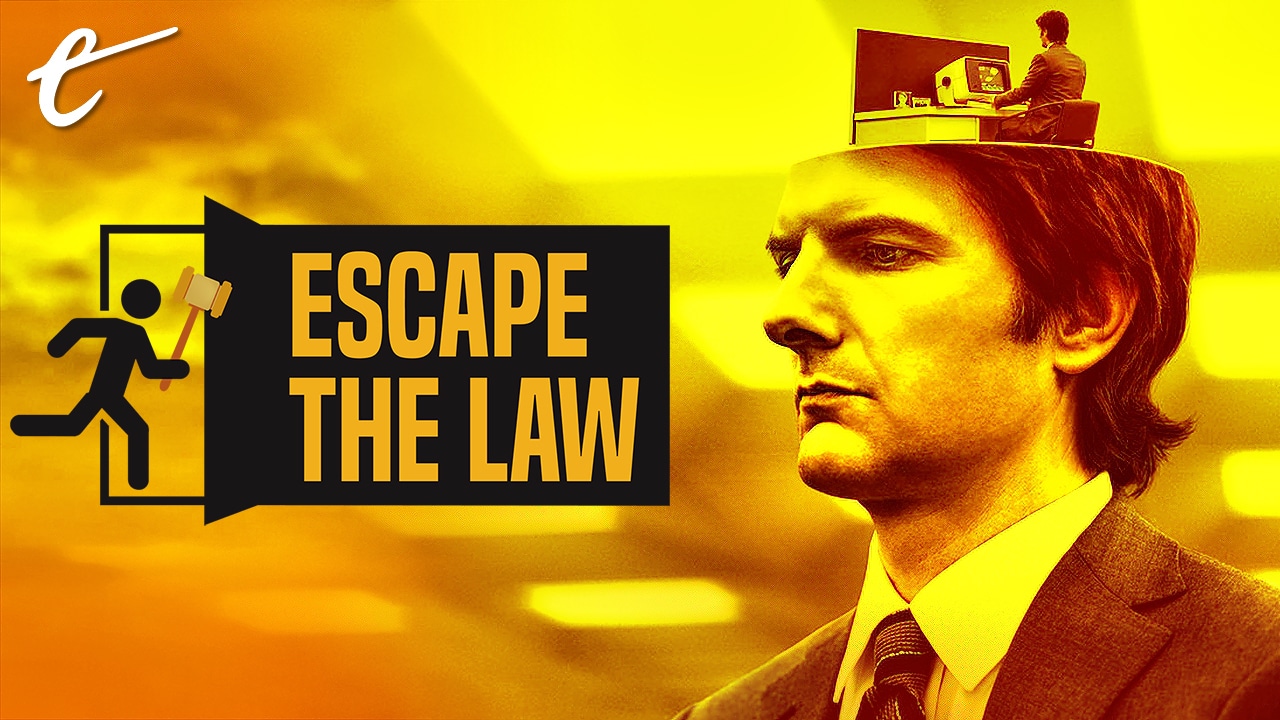Severance is special. While the show has a simple-seeming premise, Severance hides a layer of complexity that raises deep questions about morality, the law, and identity. This week, I’ll unpack the mystery of severance and consider what the law would have to say about the procedure.
What’s It All About?
Severance is a procedure that partitions memories. A “severed” person — someone who has undertaken the severance procedure — has two memory centers, or “partitions.” One partition contains all of one’s memories up until the time of the procedure. The second partition is a blank slate that contains no memories whatsoever, except for those subsequently made while in the severed state. However, a person in the severed state still retains the same skills, personality, habits, and physical characteristics from prior to the procedure.
Only one partition can be active at a time, and memories cannot be shared or transferred across states. The transition between partitions can be triggered at any time through the use of a special frequency.
How Does It Play Out in the Show?
In the show, severance is used as an employment mechanism that allows people to separate their work lives from their personal lives. The characters agree to switch to their severed state while at work and to switch back to their original state at the end of each workday.
The central conflict in the show is between the characters and themselves. When in their severed state, the characters are essentially treated like slaves. Each day, they “wake up” on an elevator on the way into work, work all day, and then step into an elevator to leave work, at which time they transition back into their original state. Thus, from the limited perspective of the severed person, they are living a life of endless work without pay, sleep, or vacation. Meanwhile, the person in the original state gets to enjoy good pay and leisure time without any memories of work.
It doesn’t take much imagination to see how one could use severance to create a nightmare for oneself, simply by switching to a severed state for any unpleasant events.

Would Severance Be Illegal?
Most legal conundrums involve questions that pit one’s rights against the rights of another. For example, how do we balance one’s right to bear arms against the government’s interest in preserving public safety? How do we balance a woman’s right to autonomy against any rights the fetus might have? How do we balance a property owner’s rights against the needs of the community to have a highway bypass? And so on.
What makes Severance unique is that it calls into question the obligations we have to ourselves. For the most part, the law has little to say on this issue. The law can prevent people from engaging in serious self-harm or from using illegal drugs, but other than that, people are free to do pretty much whatever they want to themselves. You want to free climb El Capitan? The law won’t stop you.
Of course, an obvious difference between severance and other activities is that severance is a surgical procedure that involves implanting a specialized device in the subject’s brain. In the United States, all medical devices must be approved by the FDA before they can be used, and an elective procedure like severance would only be approved by the FDA if there were an appropriate medical justification for the procedure (which seems unlikely for severance).
However, for the sake of argument, let’s assume that the FDA wouldn’t pose an obstacle to the severance procedure. Let’s say that you could perform the severance procedure without a device, such that all that would be involved would be a surgical procedure, which does not require FDA approval. If we set aside the FDA, I don’t think there would be a meaningful distinction between severance procedures and other risky or ill-advised activities.

Central to this conclusion is an understanding that severance does not create a new person, and it thus does not require us to consider the rights of a person in a severed state as distinct from the rights of a person in an original state. This is because rights and personhood are not derived from memories. If they were, then we would say that people with dementia would not have rights or that people with amnesia should be treated as new people in the eyes of the law.
Along the same lines, the law — and common sense — recognizes that people should be held accountable for their actions, rather than for their memory of those actions. Thus, a person who commits a murder while on a memory drug should still be prosecuted, convicted, and punished for that crime, even if they had no memory of it.
Once we accept that a person in a severed state is the same as a person in their original state and that people should be held responsible for their choices irrespective of their memories, then we can narrow the scope of our inquiry. The question is not, “Is it fair that the severed-state person has to work all the time?” since there is only one person. Instead, the question is, “If a person concludes that they would be happier with a memory split, should the government stop them?” or, perhaps, “Should the government prevent someone from making a decision they will come to regret?”
The answer to both of these questions is “no.” Inherent in the right to liberty is the freedom to make choices about how we live our lives. That includes the ability to distribute happiness over time as we see fit.

While we don’t have true severance in real life, we do have options that approximate severance. For example, a person could decide to work through the entirety of their 20s and 30s while taking no vacation and forming no relationships outside of work, followed by an early retirement. The fact that the person may be unhappy during their 20-year work period doesn’t mean they should not be allowed to make that choice. Likewise, the fact that the person does not spend any money while working and so feels like a slave does not mean the person is actually a slave.
The same analysis applies once the person retires — the fact that the person no longer thinks about their time at work, and instead revels in the benefits of retirement, does not seem unfair or exploitative. The fact that they don’t remember many (or any) of the details surrounding their earlier work does not change the fact that they had done the work to earn the early retirement.
In the world of Severance, individuals switch between their original state and their severed state with far greater frequency than in the above example (twice daily, rather than once in a lifetime). Yet, the rationale for the switch is essentially the same — the belief that one’s overall happiness will increase if one separates good times from bad times and experiences the two separately. There is no reason why the government should be able to prevent people from living their lives in accordance with that preference. That is especially true when one considers that jobs dealing with trade secrets or confidential information are likely to offer incentives that would provide additional reasons to sever.

Limitations on Severance in the Law
The conclusion that severance should be legal does not mean that the law should ignore the risks associated with the procedure. There are three risks worth mentioning.
First, if it turned out that severed individuals were overwhelmingly unhappy, or if they experienced significant mental instability, the government would have good reason to outlaw the procedure. For example, in the show, one of the characters attempts suicide while in a severed state. While the government should respect people’s life preferences, it should (and does) take action to prevent people from harming themselves. That action should extend to severance if appropriate.
Second, because state switches constitute a significant change in a person’s mind, there should be clear rules surrounding when a person can switch between states and who controls the timing and circumstances of any switch. While the conditions giving rise to a switch can be specified by contract, severed individuals should have the ability to switch states at will and also to prevent a switch from happening. In practice, this would avoid most or all of the problems seen on the show, since it would essentially require severed people to cooperate with themselves and thus avoid a feud between one’s original state and one’s severed state. If it turned out that most individuals do not cooperate with themselves, there would be good reason to ban the procedure.
To extend the example from above — the person who decides to work through their 20s and 30s should retain the ability to leave their job whenever they want. If they decide to stay, it is because they conclude — each day — that their current suffering is worth the benefits they will reap in the future. The same should be true for severed-state individuals. The ability to distribute happiness over time should necessarily include the ability to redistribute happiness over time if one deems it appropriate to do so. In the context of severance, this means individuals should be free to choose when they switch states and how frequently they switch states.

Lastly, the law should account for the risk that, over time, a person’s severed state and an original state may grow sufficiently far apart so as to constitute different people. At the time of the severance procedure, the only difference between states is one’s memories. Over time, however, personalities and brains can change significantly based on one’s experiences.
As an extreme example, suppose a baby is severed at birth and spends even-numbered days with one set of parents in one state and odd-numbered days with a different set of parents in the other state. By the time the child turns 20, it is possible that they would have not just different memories, but completely different personalities. Without more information as to what kind of information is shared across the partitions, it is hard to know how this risk would play out. (Would personality changes be shared across partitions? What about newly developed talents?)
If a new person emerged, then both persons would be entitled to rights and, potentially, an even split of the body. To avoid these kinds of troubles, I suspect the law would apply some kind of personality test to determine the extent of divergence, and severed individuals would be advised to stop switching states if there were a risk of divergent personalities.
Conclusion
Life is the ultimate co-op game, played between your past self and your present self, and your present self and your future self. For instance, you can choose to study for a test and give your future self a leg-up, or you can enjoy the present and let the future you suffer the consequences. Yet, because we have continuity of identity and memories, this co-op game often feels like a single-player experience — there is no present self and future self; there is just self.
Severance turns this issue on its head and imagines a world without continuity of self-identity. It asks us to consider whether our lives should be viewed through a lens of self-hostility or self-cooperation. While the world of Severance is not real, its questions have real consequences. Most people work every day, yet only 54% of employees in the United States are satisfied with their jobs. This means that most people are willing to sacrifice at least some present happiness for future gains.

Yet, I would wager that most people don’t have an understanding of how much they would sacrifice, for what benefit, or across what time frame. These questions directly inform what it means to live a good life — they speak not just to the ever elusive “work-life” balance, but to all kinds of tradeoffs — friends versus family, happy versus sad, chores versus play, and so on.
The right to liberty necessarily includes the right to distribute happiness over time. But the fact that we can distribute happiness says nothing about how we should distribute happiness. That question has a different answer for everyone and persists regardless of whether severance is real or legal. In this sense, severance poses the ultimate question of self-trust and self-awareness. But don’t worry — if you fail the test, I can make you forget it ever happened.





